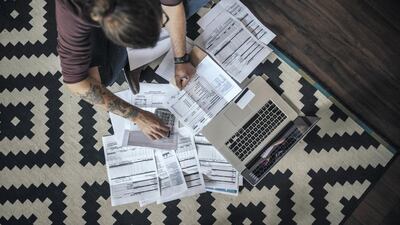Almost a year ago, offices were shut around the world to stem the rapid spread of Covid-19.
Since then some employees have been able to return to the workplace.
But a significant number remain at home and that is likely to last, according to property consultancy CBRE, which predicts a "hybrid approach" will be a trend in 2021.
Experts say a number of workplace issues are arising as companies adjust to life in "the new normal".
But they are not always the difficulties you would expect.
From anxiety to misunderstandings, and even staffing headaches owing to an increase in business, here are the five most common workplace problems during the pandemic.
Zoom lethargy
Everyone is sick of Zoom, said David Mackenzie, managing director of Mackenzie Jones Group, a recruitment company.
It reported a surge in interest from clients looking to do face-to-face interviews from the Mackenzie Jones Group office.
“We have had a bigger uptake in face-to-face meetings in the past two months than we have ever had before. We are having clients say, 'Please can we come and see you?'” he said.
"We have big interview rooms, which are now being turned into Zoom booths. But our boardroom has been utilised more than ever in the past 18 months by clients.
"They can’t use their offices, as they are restricted by numbers, so they are using our spaces for interviews.”
Communication issues
Using Zoom to conduct most meetings means people are not able to read a person’s body language. And that can create problems.
"Some people are still working remotely, so Zoom and Teams are great as you see part of the body, but of course you are missing the rest of the body language," said Claire Donnelly, co-founder of human resources consultancy Mike Hoff Consulting in Dubai.
“The social niceties that you have over Zoom, you don’t tend to have in a personal meeting, so there is no cross-debate or conversation. They may miss some key points they want to raise.
"I think there is a danger of missing some key communication.”
Mental health issues

While working from home suited some people, not everyone enjoyed it. Many were desperate to return to the office.
Mr Mackenzie said his employees could choose where they wanted to work.
“One of the issues we found was that the single people living in one-bedroom apartments with no balconies really struggled with day-to-day living, and also the lack of interaction with other people,” he said.
“When we were allowed to go back to the office, we made a call and said to people that whoever lives in a one-bedroom apartment gets priority, and whoever lives in a villa is at the back of the queue.”
Although he noticed a boost in productivity among those who returned to the office, he often has to tell those who are still at home to switch off at 5.30pm because they continue to work into the night.
Juggling an increasing workload
Ms Donnelly said that in some cases there were not enough people to keep up with an increasing workload.
So trying to hire the right people at the same time as getting the work done is creating issues for some managers.
“I can see pressure on leaders where they need to ask themselves, 'Do I have the team in place?' Companies have got a lot of work and are growing quickly, but they possibly don’t have the team in place to do that,” she said.
“Trying to find good people and taking on the work, because you can’t really say no in this environment right now, is creating a problem. And then they are having trying to train people up at the same time.”
Job anxiety
There is a real sense of anxiety among members of the UAE workforce just now, said Mr Mackenzie.
Everyone knows the country will bounce back, but not knowing when the pandemic will end makes people worried. With all eyes on case numbers and vaccination figures, few companies are hiring.
"We're busy at the moment, but a lot of our stuff is Saudi. We have done work in Iraq, and some here, but the UAE is just a bit up in the air at the moment, including Abu Dhabi," he said.
“I think businesses are waiting to see what happens.”








